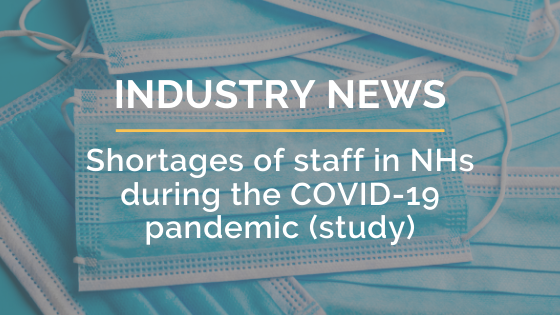Shortages of Staff in Nursing Homes During the COVID-19 Pandemic ... What are the Driving Factors? is an interesting study that “examines the prevalence and factors associated with shortages of NH staff during the COVID-19 pandemic. The primary analysis included all free-standing NHs with COVID-19 information in the week of May 31, 2020, that could be merged with NHCompare and CASPER data, resulting in 11,920 unique NHs.” The link in the first sentence is to the 7-page PDF of the study published in the current issue of JAMDA.
Conclusions and Implications:
Approximately 1 of 6 NHs self-reported having a shortage in licensed nurse and nurse aide staffing during the COVID-19 pandemic. These shortages are not evenly distributed across states. Staff shortages are mainly driven by COVID-19 factors, such as resident and staff with COVID-19, as well as PPE supply. Policymakers should further support NHs to prevent the transmission of COVID-19 among their vulnerable residents and valuable workforce and help them acquire sufficient PPE. Current policy efforts that focus on preventing the spread of the infection within and across NHs include (dis)incentives such as large fines, which might be counterproductive. Monetary penalties might motivate NHs to avoid violation of infection control, but without funds to hire and retain staff, NHs lack the capacity to fulfill the requirement. The availability of high-quality direct care workers becomes even more critical as many states are reopening the economy and lifting bans on visitors to NHs.
I encourage you to review this study. It’s a good example of the data you submit being used to analyze this pandemic as well as the importance of your data being accurate. It’s an excellent read, all the way through. Be sure to digest the information found in the Discussion section, beginning on page 4.
“Our results suggest that self-reported shortages in NH staffing are primarily associated with COVID-19 related factors. However, NHs are still faced with multiple other challenges. Media attention has put pressure on regulators to punish NHs given the large number of deaths seen nationally. However, the structure of NH care, the fact that NH residents are frail and more susceptible to the virus, and early miss-steps such as not providing NHs PPE when supplies were scarce and sending patients with coronavirus to NHs may have led to this situation. CMS has recently increased the civil monetary penalties up to $20,000 per instance for noncompliance with infection control. This places great financial challenges on NHs, especially considering that most NH care is reimbursed by Medicaid at lower than operating cost. Even before the pandemic, NHs were reliant on higher margin Medicare residents to provide financial cushion to invest in staff and quality. Indeed, NHs with higher Medicare prevalence were less likely to suffer staff shortages. Securing the financial health of NHs that allows them to address these staff shortages needs to be a priority that might help NHs ensure that fewer residents are exposed to COVID-19.”
Want to keep up with the changing COVID-19 situation in skilled nursing?



